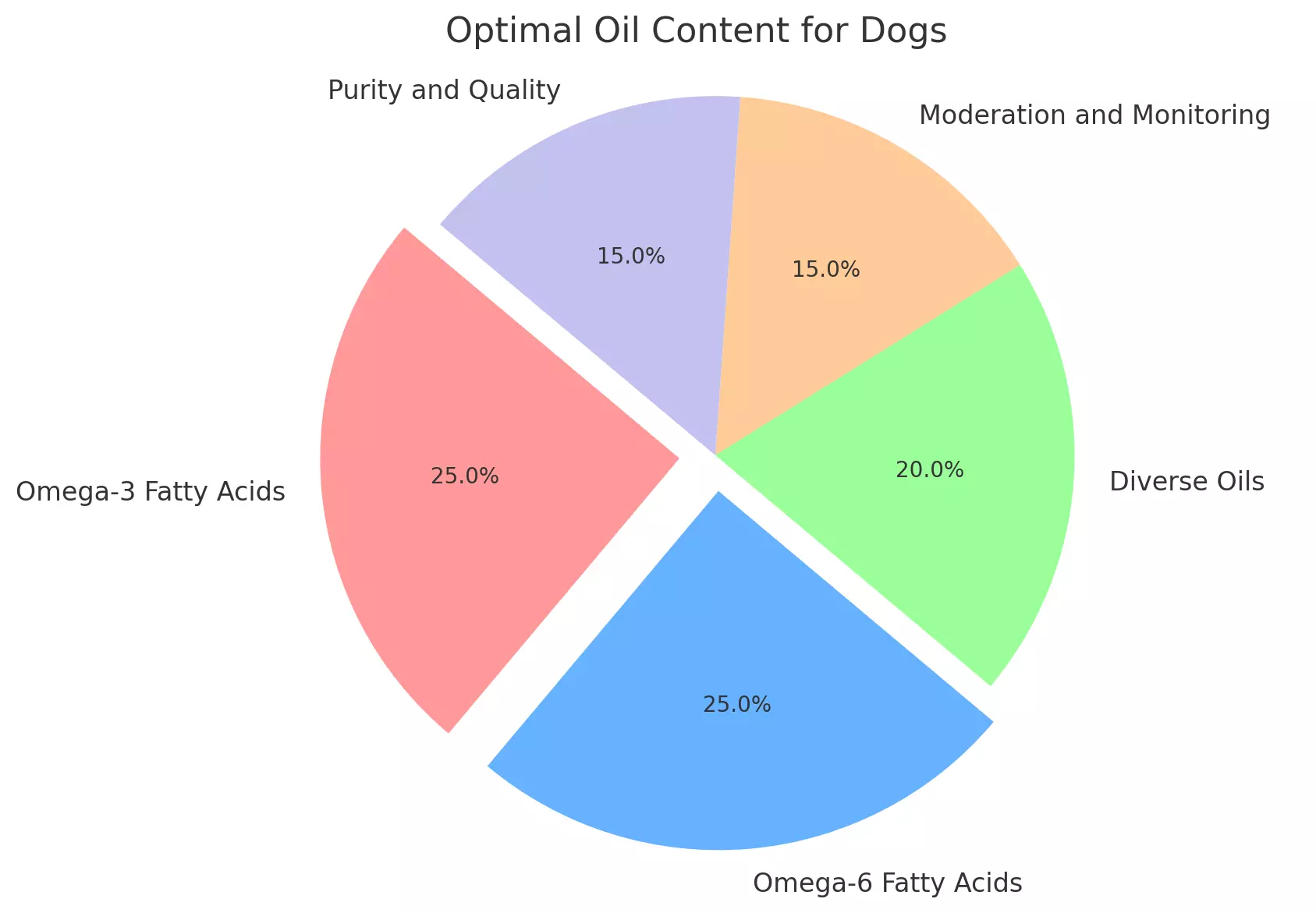What Kind of Oils Are Good for a Dog?

When it comes to pampering our furry companions, many pet owners are turning to natural solutions to ensure their pets lead healthy and happy lives. Among these natural remedies, oils have emerged as a popular choice for both dietary and topical applications for dogs. But with so many oils on the market, how do you determine which ones are beneficial for your pet? In this article, we will delve into the world of oils and outline the benefits and uses of each for our canine companions.
Optimal Oil Content for Dogs
Understanding the correct balance and content of oils for dogs is crucial for their overall health. Oils, when given in the right proportions, can offer numerous benefits, but the wrong balance or overconsumption can lead to health issues.

- Omega-3 Fatty Acids (25%): These are crucial for reducing inflammation, supporting skin and coat health, and enhancing cognitive and eye health.
- Omega-6 Fatty Acids (25%): Vital for promoting healthy skin, stimulating hair growth, and supporting the immune system.
- Diverse Oils (20%): To provide a range of benefits, it's recommended to rotate between different oils.
- Moderation and Monitoring (15%): It's essential to adjust the oil's amount based on the dog's size, weight, and overall dietary intake, and to monitor for any adverse reactions.
- Purity and Quality (15%): Ensuring that the oil is of high quality and free from contaminants is crucial for a dog's health.
Remember, this chart provides a general overview. The specific needs might vary based on individual dogs, their health conditions, and their diets. Always consult with a veterinarian when making significant changes to your dog's diet.
1. Balance of Omega-3 and Omega-6 Fatty Acids:
Omega-3 fatty acids primarily come from fish oils (like salmon and krill oil) and certain plant oils (like flaxseed). They are instrumental in:
- Reducing inflammation
- Supporting skin and coat health
- Enhancing cognitive and eye health
Omega-6 fatty acids are abundant in many vegetable oils, such as sunflower and safflower oil. They play roles in:
- Promoting healthy skin
- Stimulating hair growth
- Supporting the immune system
However, the modern canine diet, especially commercial dog foods, tends to have an overabundance of omega-6 fatty acids and not enough omega-3s. Ideally, dogs should have a ratio ranging from 5:1 to 10:1 (omega-6 to omega-3). Balancing this ratio is crucial to reap the benefits and prevent potential inflammation.
2. Moderation is Key:
While oils are beneficial, they are also calorie-dense. Overconsumption can lead to obesity, which brings a host of health problems. It's essential to adjust the amount of oil based on the dog's size, weight, and overall dietary intake. Always start with a smaller dose and gradually increase if needed, monitoring your dog's weight and overall health.
3. Purity and Quality:
Not all oils are created equal. When choosing oils for your dog, opt for those that are:
- Cold-pressed or wild-caught
- Free from contaminants or harmful chemicals
- Stored in dark, airtight containers to prevent rancidity
4. Diversity:
Instead of sticking to just one type of oil, rotate between different oils to provide a range of benefits. For example, while fish oil is excellent for omega-3s, coconut oil offers antibacterial properties, and olive oil is rich in antioxidants.
5. Monitoring for Allergies or Sensitivities:
Every dog is an individual, and what works for one might not work for another. Some dogs might have sensitivities or allergies to certain oils. Always introduce a new oil gradually and monitor for any adverse reactions such as itching, digestive upset, or changes in behavior.
Oils can be a valuable addition to a dog's diet, but it's essential to ensure the right balance, purity, and diversity. Regularly consulting with a veterinarian and keeping up-to-date with current canine nutritional research will help in making informed decisions about the best oil content for your furry friend.
Examples of Good Oil Sources
1. Fish Oil:
Benefits: Fish oils, particularly those sourced from cold-water fish like salmon, sardines, and mackerel, are rich in omega-3 fatty acids, including eicosapentaenoic acid (EPA) and docosahexaenoic acid (DHA). These fatty acids have been shown to:
- Improve skin and coat health
- Reduce inflammation, beneficial for dogs with arthritis or allergies
- Aid in cognitive development in puppies
- Support heart health
Usage: Fish oil can be added to a dog's food or given as a supplement. It's important to ensure that the fish oil you purchase is of high quality and free from harmful contaminants.
2. Coconut Oil:
Benefits: Coconut oil contains medium-chain triglycerides (MCTs) which can provide several health benefits:
- Boosts the immune system
- Improves skin and coat condition, reducing itchiness and dryness
- Acts as an antifungal and antibacterial agent
- Can improve cognitive function in older dogs
Usage: Coconut oil can be applied topically to the skin or added to a dog's diet. However, moderation is key as excessive amounts can lead to weight gain.
3. Flaxseed Oil:
Benefits: Another excellent source of omega-3 fatty acids, flaxseed oil can:
- Enhance skin and coat health
- Reduce inflammation
- Support cardiovascular health
Usage: Flaxseed oil can be mixed into a dog's food. Ensure it's stored in a cool, dark place to prevent it from becoming rancid.
4. Olive Oil:
Benefits: Olive oil, especially extra virgin variety, offers several benefits:
- Promotes a shiny coat and healthy skin
- Can help reduce shedding
- Contains antioxidants and anti-inflammatory properties
Usage: Olive oil can be drizzled over a dog's food in small amounts. Avoid excessive quantities as it can lead to diarrhea.
5. Hemp Oil:
Benefits: Derived from the seeds of the hemp plant, hemp oil:
- Alleviates joint pain and inflammation
- Supports a healthy immune system
- Enhances skin and coat condition
Usage: Hemp oil can be added to a dog's food or given as a supplement. Ensure you're purchasing a high-quality product designed for pets.
6. Krill Oil:
Benefits: Similar to fish oil, krill oil is a potent source of EPA and DHA but with an added benefit:
- Contains astaxanthin, a powerful antioxidant
- Supports brain and eye health
- Enhances heart health
Usage: Krill oil can be given as a supplement or mixed with a dog's meal.
7. Sunflower Oil:
Benefits: Sunflower oil is high in omega-6 fatty acids, which:
- Improve skin health
- Stimulate hair growth
- Boost the immune system
Usage: Small amounts of sunflower oil can be added to a dog's diet. However, ensure a balanced ratio of omega-3 to omega-6 fatty acids in your dog's overall diet.
Incorporating oils into your dog's regimen can offer numerous health benefits. However, it's crucial to introduce any new supplement gradually and monitor your dog for any adverse reactions. Always consult with your veterinarian before making significant changes to your dog's diet, especially if they have pre-existing health conditions. With the right balance and quality products, oils can be a great addition to ensuring your dog's optimal health.

